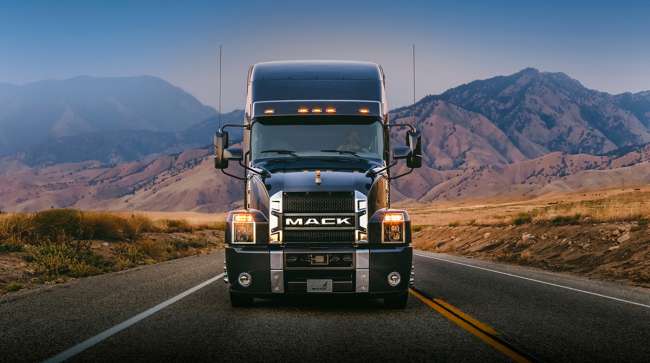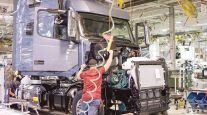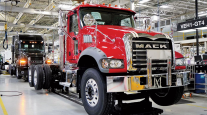Senior Reporter
Class 8 Orders in August Hit Five-Month High

[Stay on top of transportation news: Get TTNews in your inbox.]
North American Class 8 orders in August nearly hit 37,000, marking a five-month high with demand showing no sign of a letup, and also no letup from issues causing problems in filling them, ACT Research reported.
Orders reached 36,900, according to ACT, citing truck makers’ preliminary net data that will be revised later this month.
A year earlier, orders reached 19,500.
Industry analysts characterized August’s volume as a sign of the OEMs’ “piecemeal” or “lumpy” opening of their order boards in the face of ongoing price hikes for materials, as supply chain shortages continue on a daily basis.
“In this reality we are in today, where customers continue to demand trucks and are having a hard time getting them, it’s interesting to see that many of them signing up and saying ‘Yes, I want trucks, please,’ ” ACT Vice President Steve Tam said.
And more “red tag” trucks keep moving outside where they wait for a last part to come in and be installed, he added.
FTR pegged preliminary net orders at 39,400.
The supply chain worsened in July, and there are indications it might not have improved much in August, said Don Ake, vice president of commercial vehicles for FTR.
ACT Research: Preliminary NA Class 8 and MD Orders Hit Respective Five-Month Highshttps://t.co/rr2TET6yrG — ACT Research (@actresearch) September 2, 2021
Deliveries of semiconductor chips have slowed mainly because of a big increase in COVID-19 infection rates in Malaysia and Japan, Ake said.
Large commercial trucks run with 50, 60, 80 million lines of code, according to experts.
“I cannot remember a time where demand is huge but the order entry is so modified,” Ake said. “Typically OEMs would be booking all the commitments they have, but under this supply chain situation they are entering those orders much more deliberately.”
But many monthly orders of a new kind are coming.

Fleet managers find that healthy, happy drivers are key to business success. Stephen Kane of Rolling Strong says driver health starts with “being vulnerable enough to listen to somebody that knows about health.” Hear a snippet above, and get the full program by going to RoadSigns.TTNews.com.
Overall, one-third of the Classes 4-8 commercial vehicle market in the United States and Canada will migrate to battery-electric solutions in the next 10 years, according to a recent ACT study.
WardsAuto.com reported through July, Classes 4-8 U.S. retail year-to-date sales (which come from orders) alone totaled 267,719 — 33% would be 88,347.
Tam would not be more specific about the report’s details, except to say, “I can tell you that adoption will be greater than that for Classes 4-7 and local Class 8 vehicles.”
He added: “Keep in mind that we will likely have another round of emissions legislation coming into effect in that time frame that will either mandate increased electric vehicle, or zero-emission vehicle, adoption and/or make internal combustion engine-powered trucks more expensive, tipping the scales more favorably toward EV.”
Fleet Advantage, an equipment financing, and life cycle cost management company, released results from a recent survey of 550 fleet executives pointing to changing trends in fuel economy, maintenance, environmental concerns and procurement strategies.
According to the procurement portion of the survey:
- 41% of fleet executives said the supply of new trucks and inventory challenges have altered their truck procurement plans due to lead times.
- 17% have begun to identify alternate procurement strategies for new trucks.
- Another 17% say the inventory challenges mean they may hold onto current trucks even longer than normal, which may be detrimental to their total cost of ownership.
- 31% of respondents are leasing their trucks, up from last year’s similar survey when only 14% were leasing.
- 28% are in an unbundled lease agreement and “see greater value on flexible fuel and maintenance costs.”
- 20% are in a full-service lease, with some saying they are “trying to escape the contract because of inflexible costs on fuel and maintenance.”
- 68% are monitoring possible tax policy changes as part of their procurement strategies.
- 3% are currently procuring electric Class 8 vehicles, down 3% compared with the company’s similar survey in 2020.
- 33% may consider electric Class 8s in 1-3 years, up 9% compared with its 2020 survey.
- 54% may consider electric Class 8s in 5-10 years, up 3% compared with its survey in 2020.
Separately, Bill Bliem, senior vice president of fleet services at NFI, said the company expects battery-electric trucks will provide a 300-350 mile range. “Fuel cells will be in our longer range vehicles.”
NFI has ordered 20 battery-electric Class 8s from Volvo Trucks North America, and 30 from Daimler Trucks North America, as it moves to convert its Southern California drayage fleet to zero emissions by 2023.
NFI ranks No. 16 on the Transport Topics Top 100 list of the largest for-hire carriers in North America.
The 50 battery-electric trucks coming to NFI’s Ontario, Calif., facility will constitute the first 100% zero-emission logistics fleet in the state.
Want more news? Listen to today's daily briefing below or go here for more info:




